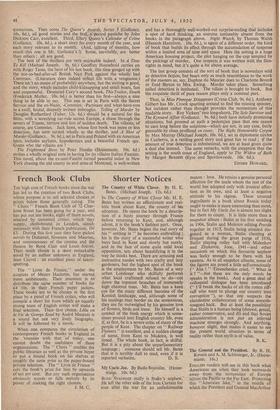Shorter 'Notices
The Country of White Clover. By H. E. Bates. (Michael Joseph. 12s. 6d.) IN The Country of White Clover Mr. H. E. Bates has written an affectionate and real- istic book about Kent, the county of his adoption. He opens the book by a descrip- tion of a hasty journey through France before' returning to Kent, and, although adroit, it is the book's feeblest part. Once, however, Mr. Bates begins the real story of his " settling in " he becomes enthralling ; his is the story of a successful writer who buys land in Kent and slowly but surely, and in the face of some quite mild local opposition, sets about beautifying it in the way he thinks best. There are amusing and instructive tussles with two crafty and lazy gardeners, but the highest spot of the book is the employment by Mr. Bates of a very urban Londoner who skilfully performs what local craftsmed. refused to do—cut down the topmost branches of immensely high chestnut trees. Mr. Bates has a keen eye for the many different beauties of- the Kentish landscape, and, although some of his musings may border on the sententious, they are far outweighed by his genuine love of flowers, birds and trees. He himself is a symbol of the fresh energy which is some- times poured into English country life, even if, at first, he is a severe critic of many of the people of Kent. The chapter on " Railway Flowers " is excellent, and a sudden change of scene, from Kent to Madeira, is well timed. The whole book, in fact, is skilful. But it is a pity about the unparliamentary language ; someone should tell Mr. Bates that it is terribly dull to read, even if it is reported verbatim. D. S.


























































 Previous page
Previous page